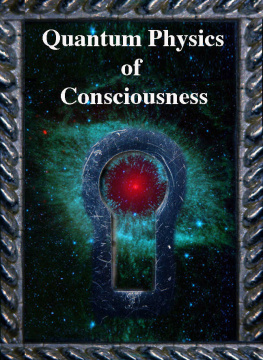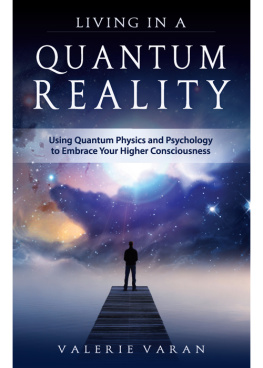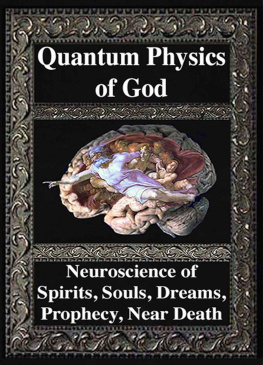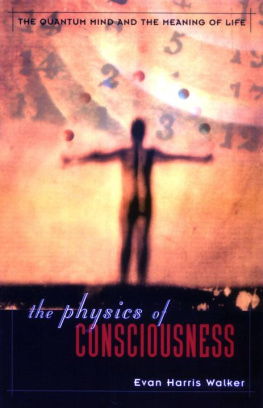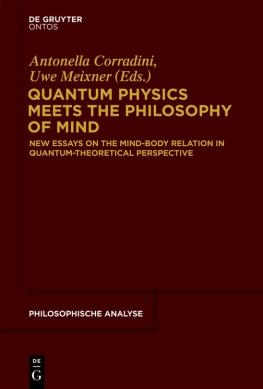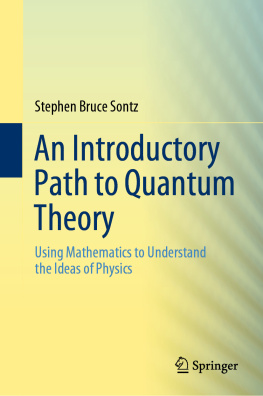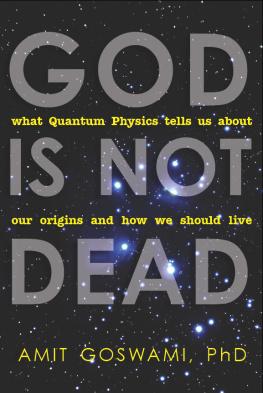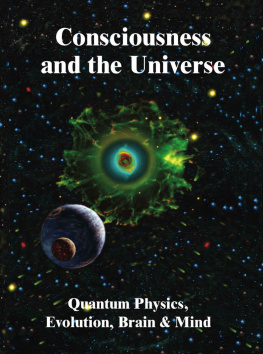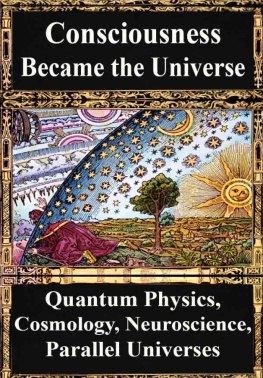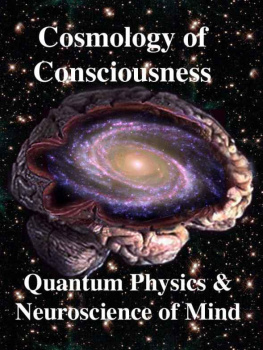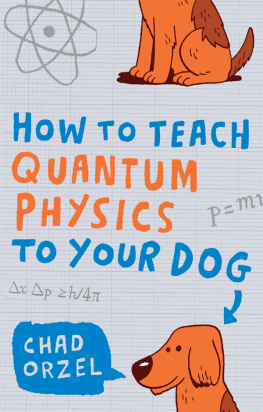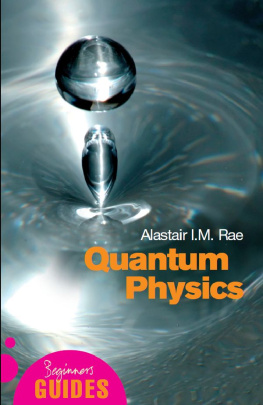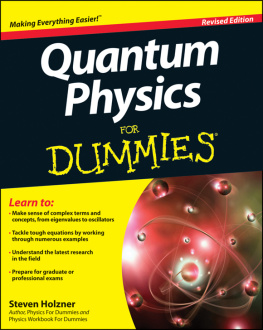Bruce Rosenblum - Quantum Physics of Consciousness
Here you can read online Bruce Rosenblum - Quantum Physics of Consciousness full text of the book (entire story) in english for free. Download pdf and epub, get meaning, cover and reviews about this ebook. year: 2011, publisher: Cosmology Science Publishers, genre: Religion. Description of the work, (preface) as well as reviews are available. Best literature library LitArk.com created for fans of good reading and offers a wide selection of genres:
Romance novel
Science fiction
Adventure
Detective
Science
History
Home and family
Prose
Art
Politics
Computer
Non-fiction
Religion
Business
Children
Humor
Choose a favorite category and find really read worthwhile books. Enjoy immersion in the world of imagination, feel the emotions of the characters or learn something new for yourself, make an fascinating discovery.
- Book:Quantum Physics of Consciousness
- Author:
- Publisher:Cosmology Science Publishers
- Genre:
- Year:2011
- Rating:5 / 5
- Favourites:Add to favourites
- Your mark:
- 100
- 1
- 2
- 3
- 4
- 5
Quantum Physics of Consciousness: summary, description and annotation
We offer to read an annotation, description, summary or preface (depends on what the author of the book "Quantum Physics of Consciousness" wrote himself). If you haven't found the necessary information about the book — write in the comments, we will try to find it.
Quantum Physics of Consciousness — read online for free the complete book (whole text) full work
Below is the text of the book, divided by pages. System saving the place of the last page read, allows you to conveniently read the book "Quantum Physics of Consciousness" online for free, without having to search again every time where you left off. Put a bookmark, and you can go to the page where you finished reading at any time.
Font size:
Interval:
Bookmark:

Quantum Physics
of Consciousness
Contents Selected From Volumes 3 and 14
Journal of Cosmology
Editor of Volume 3
Subhash Kak, Ph.D.
Oklahoma State University, Oklahoma
Editor of Volume 14
Sir Roger Penrose
University of Oxford, Oxford, United Kingdom
Stuart Hameroff, M.D.
University of Arizona, Arizona,
Cosmology Science Publishers, Cambridge, 2011
Lana Tao, Managing Editor
Copyright 2009, 2010, 2011, 2012, Cosmology Science Publishers,
JournalofCosmology.com, Cambridge,
Copyright 2000, 2003, 2012
All rights reserved. This book is protected by copyright. No part of this book may be reproduced in any form or by any means, including photocopying, or utilized in any information storage and retrieval system without permission of the copyright owner.
ISBN: 978-1-938024-11-5
1938024117
Contents
1. The Universe, Quantum Physics, and Consciousness , Subhash Kak, Ph.D.
Head, Department of Computer Science, Oklahoma State University, Stillwater
Abstract
This article presents the case for the existence of a separate principle of consciousness to complement physical law. Since this principle cannot be dynamical, it is suggested that it manifests itself by enhancing probabilities associated with natural processes in a manner that favors life. Improbable coincidences attested in the literature are presented as evidence of this probability enhancement.
1. Introduction
There are two essential parts to understanding the universe: its representation in terms of material objects, and the manner in which this representation changes with time. In philosophy, these are the positions of two different schools, one believing that reality is being, and the other that it is becoming.
The conception of the cosmos, consisting of the material universe and observers, has been shaped by ideas that belong to these two opposite schools. The conception of the world as being is associated with materialism, while that of becoming is associated with idealism. In the materialist view, mental experience is emergent on the material ground and contents of the mind are secondary to the physical world. Conversely, in the idealist position consciousness has primacy.
The question of consciousness is connected to the relationship between brain and mind. Reductionism considers them to be identical -- with mind representing the sum total of the activity in the brain -- at a suitable higher level of representation. Opposed to this is the viewpoint that although mind requires a physical structure, it ends up transcending that structure. There exist a host of other views of mind, shaped by culture and life-experience, which are characterized by a tension between opposite beliefs systems applied to different aspects of life. Quantum mechanics is relevant to a discussion of the cosmos, since it is the deepest theory of physics and it is a theory of observables in which information is the fundamental quantity. John Archibald Wheeler used the slogan It from bit to stress that our constructions of reality are based on responses on our instruments to yes-no questions. He declared that all things physical are information-theoretic in origin and this is a participatory universe (Wheeler, 1990), where the term participatory implies that observations effect the evolution of the universe. Whereas observables are central to quantum mechanics, there is nothing in it on who makes the observations or if observers fit into its framework.
Just as there exists the outer cosmos the physical universe , there also exists the corresponding inner cosmos of the mind. The mind processes signals coming into the brain to obtain its understandings in the domains of seeing, hearing, touching, and tasting using its store of memories. The cognitive act is an active process where the selectivity of the sensors and the accompanying processing in the brain is organized based on the expectation of the cognitive task and on effort, will and intention.
The structure of the inner cosmos belongs to the domain of psychology, but it is fair to assume that at some level it mirrors the outer cosmos. In the schematic of Figure 1 it is indicated that if quantum theory describes processes for the outer cosmos, consciousness does so for the inner cosmos. Since quantum theory must ultimately underlie the processes in the inner cosmos, it appears that for the sake of symmetry it should be possible for consciousness to influence the outer cosmos.

Figure 1. Inner and outer cosmoses, the law, and consciousness.
In the view that consciousness is complementary to space, time and matter, it needs material support to be embodied as awareness. Conversely, it is meaningless to speak of a universe without observers. If we accept that we have discovered the basic laws of nature and also that classical machines cannot be conscious, one may like to assume that quantum processing in the brain, given appropriate brain structures, leads to awareness. Different states of consciousness such as wakefulness, sleep, dream-sleep, coma have distinct neurochemical signatures, and these different states may be taken to be modifications caused by the neural circuitry on a basic state of consciousness. But quantum machines cannot be assumed to have the capacity to be conscious because of the observer paradox outlined in the next section.
Although consciousness cannot be studied directly, it is accessible to further understanding indirectly. In this article, we show why observers are essential in the universe. We do this not by resorting to anthropic arguments, but rather to quantum theory itself. We suggest that improbable coincidences corroborated in literature support the existence of a universal consciousness principle, but, of course, they cannot be taken to be proof for it.
2. The Observer Paradox
Although the inner cosmos is physically located in the brain, we cannot speak of where in the brain the perceiving self resides because that would amount to a homunculus argument. The perceiving self cannot be in a unique neuron in the brain, because that would require such a neuron to have the capacity to process all the information that the individual possesses, which is clearly impossible for a cellular structure that can only do simple processing. Conversely, if the perceiving self was distributed over an area, then we need to postulate another homunculus within this area to process the information reaching the self.
Thus the conscious self can neither be localized to a single cell, nor assumed to be distributed over the entire brain or a part of it. We cannot speak of where the self is, but only of how the self obtains knowledge. Since the self is associated with the brain it uses it as the lens through which to perceive the world. Our knowledge of the word is, therefore, contingent on the neurophysiologic nature of the brain. If we are able to make sense of the world it is because we are biologically programmed to do so and we have innate capacity for it. Our conception of the cosmos is based on the relationship between our brain and mind. This idea is expressed in the slogan that the outer is mirrored in the inner. In an elaboration of this idea it is assumed that patterns seen in the outer world characterize the inner world as well.
Sacred architecture in many cultures replicated conceptions of the universe. The cathedral is a representation of the heavens of the Christian cosmos. In ancient India, it was concluded, using elementary measurements, that the relative distance to the sun and the moon from the earth is approximately 108 times their respective diameters. The diameter of the sun is likewise approximately 108 times the diameter of the earth, and this fact could have been established from the relative durations of the solar and lunar eclipses.
Next pageFont size:
Interval:
Bookmark:
Similar books «Quantum Physics of Consciousness»
Look at similar books to Quantum Physics of Consciousness. We have selected literature similar in name and meaning in the hope of providing readers with more options to find new, interesting, not yet read works.
Discussion, reviews of the book Quantum Physics of Consciousness and just readers' own opinions. Leave your comments, write what you think about the work, its meaning or the main characters. Specify what exactly you liked and what you didn't like, and why you think so.

